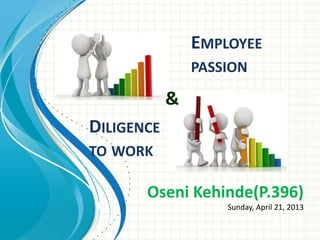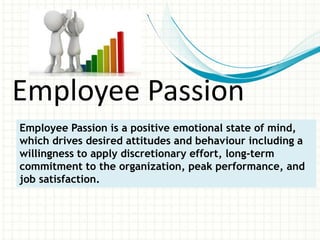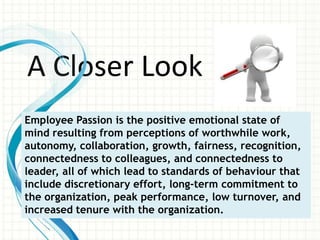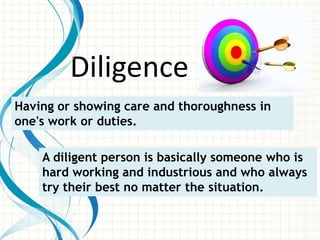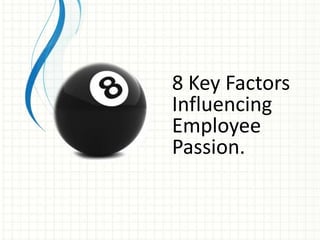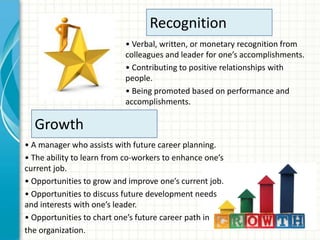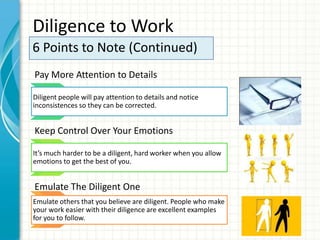Employee Passion & Diligence to Work
- 1. EMPLOYEE PASSION Oseni Kehinde(P.396) Sunday, April 21, 2013 DILIGENCE TO WORK &
- 2. Scope of Presentation ŌĆó Definition of Employee Passion & Diligence ŌĆó Factors that influence Employee Passion ŌĆó How to Learn to be Diligent ŌĆó Summary
- 3. Employee Passion is a positive emotional state of mind, which drives desired attitudes and behaviour including a willingness to apply discretionary effort, long-term commitment to the organization, peak performance, and job satisfaction. Employee Passion
- 4. A Closer Look Employee Passion is the positive emotional state of mind resulting from perceptions of worthwhile work, autonomy, collaboration, growth, fairness, recognition, connectedness to colleagues, and connectedness to leader, all of which lead to standards of behaviour that include discretionary effort, long-term commitment to the organization, peak performance, low turnover, and increased tenure with the organization.
- 5. Diligence Having or showing care and thoroughness in one's work or duties. A diligent person is basically someone who is hard working and industrious and who always try their best no matter the situation.
- 7. ŌĆó Meaningful Work1 ŌĆó Collaboration2 ŌĆó Fairness3 ŌĆó Autonomy4 ŌĆó Recognition5 ŌĆó Growth6 ŌĆó Connectedness with Leader7 ŌĆó Connectedness with Colleagues8 8 Key Factors Influencing Employee Passion
- 8. Meaningful Work ŌĆó An organization that offers a quality product or service to its customers. ŌĆó Understanding how oneŌĆÖs work adds value to the organization and creates positive results. ŌĆó An organization that is focused on a purpose other than making money and does meaningful work. Collaboration ŌĆó An organizational culture that encourages sharing, interdependence, and team spirit. ŌĆó An environment where co-workers and leaders express appreciation for each otherŌĆÖs ideas and support each other on projects and tasks. ŌĆó An environment that supports and encourages positive and cooperative relationships with others in the organization.
- 9. Fairness ŌĆó Benefits, resources, and workloads are fair and balanced across the organization. ŌĆó Consistent application of decisions, policies, and procedures. ŌĆó Compensation based on performance and industry averages. Autonomy ŌĆó The ability to choose how tasks are performed. ŌĆó Having the information and authority needed to make decisions about oneŌĆÖs work. ŌĆó Being trusted to do oneŌĆÖs job without interference. ŌĆó Knowing the boundaries and limits in regard to decision-making authority.
- 10. Recognition ŌĆó Verbal, written, or monetary recognition from colleagues and leader for oneŌĆÖs accomplishments. ŌĆó Contributing to positive relationships with people. ŌĆó Being promoted based on performance and accomplishments. Growth ŌĆó A manager who assists with future career planning. ŌĆó The ability to learn from co-workers to enhance oneŌĆÖs current job. ŌĆó Opportunities to grow and improve oneŌĆÖs current job. ŌĆó Opportunities to discuss future development needs and interests with oneŌĆÖs leader. ŌĆó Opportunities to chart oneŌĆÖs future career path in the organization.
- 11. Connectedness with Leader ŌĆó Sharing personal information. ŌĆó Making an effort to build rapport. ŌĆó Taking a personal and professional interest in oneŌĆÖs direct reports. ŌĆó Acting with integrity. Connectedness with Colleagues ŌĆó Sharing personal information ŌĆó Making an effort to build rapport ŌĆó Taking a personal and professional interest ŌĆó Trust and integrity
- 12. HOW TO LEARN TO BE DILIGENT
- 13. Diligence to Work 6 Points to Note Time Consciousness Arrive on time for appointments and for work. This shows that you are being diligent and helps you to always be prepared. Work Carefully People who are diligent work carefully and meticulously, being careful not to make mistakes, and making sure that all the information presented can be understood by others. Volunteer for Challenges Part of being a hard worker is pitching in when you are needed, even when you are not directly asked.
- 14. Diligence to Work 6 Points to Note (Continued) Pay More Attention to Details Diligent people will pay attention to details and notice inconsistences so they can be corrected. Keep Control Over Your Emotions ItŌĆÖs much harder to be a diligent, hard worker when you allow emotions to get the best of you. Emulate The Diligent One Emulate others that you believe are diligent. People who make your work easier with their diligence are excellent examples for you to follow.
- 15. Summary Factors that influence Employee Passion ŌĆó Meaningful Work ŌĆó Collaboration ŌĆó Fairness ŌĆó Autonomy ŌĆó Recognition ŌĆó Growth ŌĆó Connectedness with Leader ŌĆó Connectedness with Colleagues How To Learn To Be Diligent ŌĆó Time Consciousness ŌĆó Work Carefully ŌĆó Volunteer For Challenges ŌĆó Pay More Attention to Details ŌĆó Keep Control Over Your Emotions ŌĆó Emulate The Diligent One
- 16. Resources ŌĆó http://www.kenblanchard.c om/img/pub/Blanchard- Employee-Passion.pdf ŌĆó <http://www.ehow.com/pri nt/how_8462914_learn- diligent.html ŌĆó www.google.com
- 17. QUESTIONS?

